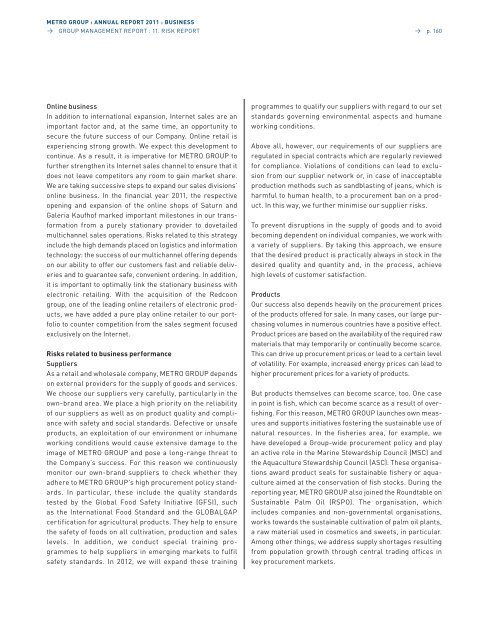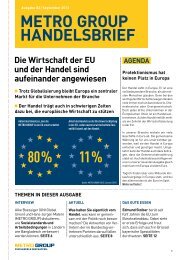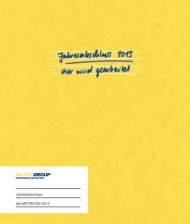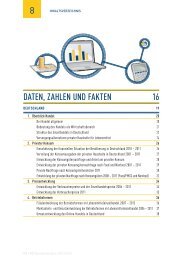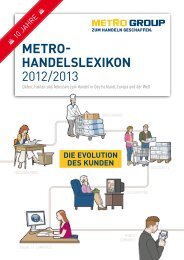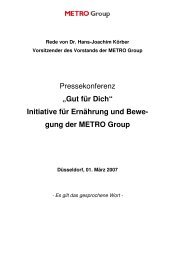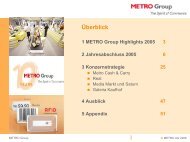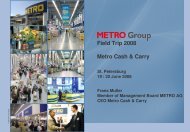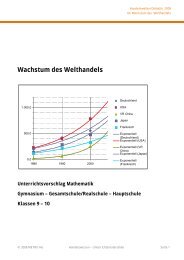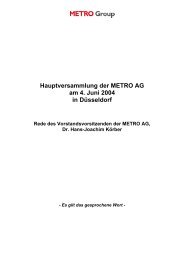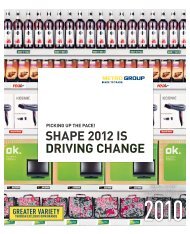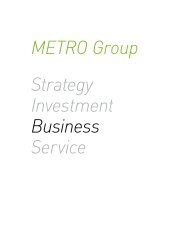pdf (22.8 MB) - METRO Group
pdf (22.8 MB) - METRO Group
pdf (22.8 MB) - METRO Group
Create successful ePaper yourself
Turn your PDF publications into a flip-book with our unique Google optimized e-Paper software.
<strong>METRO</strong> GROUP : ANNUAL REPORT 2011 : BUSINESS<br />
→ GROUP MANAGEMENT REPORT : 11. Risk REPORT<br />
Online business<br />
In addition to international expansion, Internet sales are an<br />
important factor and, at the same time, an opportunity to<br />
secure the future success of our Company. online retail is<br />
experiencing strong growth. We expect this development to<br />
continue. as a result, it is imperative for MeTRo GRoUp to<br />
further strengthen its Internet sales channel to ensure that it<br />
does not leave competitors any room to gain market share.<br />
We are taking successive steps to expand our sales divisions’<br />
online business. In the financial year 2011, the respective<br />
opening and expansion of the online shops of saturn and<br />
Galeria Kaufhof marked important milestones in our transformation<br />
from a purely stationary provider to dovetailed<br />
multichannel sales operations. Risks related to this strategy<br />
include the high demands placed on logistics and information<br />
technology: the success of our multichannel offering depends<br />
on our ability to offer our customers fast and reliable deliveries<br />
and to guarantee safe, convenient ordering. In addition,<br />
it is important to optimally link the stationary business with<br />
electronic retailing. With the acquisition of the Redcoon<br />
group, one of the leading online retailers of electronic products,<br />
we have added a pure play online retailer to our portfolio<br />
to counter competition from the sales segment focused<br />
exclusively on the Internet.<br />
Risks related to business performance<br />
Suppliers<br />
as a retail and wholesale company, MeTRo GRoUp depends<br />
on external providers for the supply of goods and services.<br />
We choose our suppliers very carefully, particularly in the<br />
own-brand area. We place a high priority on the reliability<br />
of our suppliers as well as on product quality and compliance<br />
with safety and social standards. Defective or unsafe<br />
products, an exploitation of our environment or inhumane<br />
working conditions would cause extensive damage to the<br />
image of MeTRo GRoUp and pose a long-range threat to<br />
the Company’s success. For this reason we continuously<br />
monitor our own-brand suppliers to check whether they<br />
adhere to MeTRo GRoUp’s high procurement policy standards.<br />
In particular, these include the quality standards<br />
tested by the Global Food safety Initiative (GFsI), such<br />
as the International Food standard and the GloBalGap<br />
certification for agricultural products. They help to ensure<br />
the safety of foods on all cultivation, production and sales<br />
levels. In addition, we conduct special training programmes<br />
to help suppliers in emerging markets to fulfil<br />
safety standards. In 2012, we will expand these training<br />
→ p. 160<br />
programmes to qualify our suppliers with regard to our set<br />
standards governing environmental aspects and humane<br />
working conditions.<br />
above all, however, our requirements of our suppliers are<br />
regulated in special contracts which are regularly reviewed<br />
for compliance. violations of conditions can lead to exclusion<br />
from our supplier network or, in case of inacceptable<br />
production methods such as sandblasting of jeans, which is<br />
harmful to human health, to a procurement ban on a product.<br />
In this way, we further minimise our supplier risks.<br />
To prevent disruptions in the supply of goods and to avoid<br />
becoming dependent on individual companies, we work with<br />
a variety of suppliers. By taking this approach, we ensure<br />
that the desired product is practically always in stock in the<br />
desired quality and quantity and, in the process, achieve<br />
high levels of customer satisfaction.<br />
Products<br />
our success also depends heavily on the procurement prices<br />
of the products offered for sale. In many cases, our large purchasing<br />
volumes in numerous countries have a positive effect.<br />
product prices are based on the availability of the required raw<br />
materials that may temporarily or continually become scarce.<br />
This can drive up procurement prices or lead to a certain level<br />
of volatility. For example, increased energy prices can lead to<br />
higher procurement prices for a variety of products.<br />
But products themselves can become scarce, too. one case<br />
in point is fish, which can become scarce as a result of overfishing.<br />
For this reason, MeTRo GRoUp launches own measures<br />
and supports initiatives fostering the sustainable use of<br />
natural resources. In the fisheries area, for example, we<br />
have developed a <strong>Group</strong>-wide procurement policy and play<br />
an active role in the Marine stewardship Council (MsC) and<br />
the aquaculture stewardship Council (asC). These organisations<br />
award product seals for sustainable fishery or aquaculture<br />
aimed at the conservation of fish stocks. During the<br />
reporting year, MeTRo GRoUp also joined the Roundtable on<br />
sustainable palm oil (Rspo). The organisation, which<br />
includes companies and non-governmental organisations,<br />
works towards the sustainable cultivation of palm oil plants,<br />
a raw material used in cosmetics and sweets, in particular.<br />
among other things, we address supply shortages resulting<br />
from population growth through central trading offices in<br />
key procurement markets.


